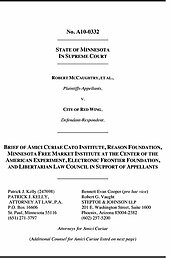McCaughtry v. City of Red Wing
Learn more about Cato’s Amicus Briefs Program.
A person’s home is his castle and thus affords certain protections and immunities — including the right to exclude unwanted visitors — that apply whether you own or rent. Unfortunately, ordinances authorizing general administrative searches of rental properties have been increasingly adopted by local authorities with little protection for privacy interests. These inspections reach the whole of the buildings and all of the activity that occurs within, opening up every aspect of people’s lives to the government: political and religious affiliations, intimate relationships, and even all those Justin Bieber posters and Fifty Shades of Gray books you hide when people come over. For the past five years, the city of Red Wing, Minnesota, has been enforcing such a rental property inspection program whereby landlords and tenants must routinely open their doors to government agents. These searches take place even if both the landlord and tenant believe it not to be necessary. The owner of the property even has to pay a fee for the unwanted search to receive a rental license! The city sometimes makes initial requests for consent, but these are mere courtesy because the city proceeds with an administrative warrant in the event of a refusal — without a showing of probable cause to believe there’s a housing code violation or other problem. The inspection ordinance doesn’t even attempt to prevent the disclosure of information revealed during the search; the whole neighborhood may find out that you have five different facial cleansers and an unusual amount of apple sauce. A group of landlords and tenants have thus challenged the inspection program, arguing that several alternatives are available to meet what legitimate interests local governments have. They successfully opposed three applications made for administrative warrants and now seek a declaratory judgment such that the rental inspection ordinance is declared unconstitutional. Unfortunately, the U.S. Supreme Court has read the Fourth and Fourteenth Amendments as not prohibiting such legislation, but of course states are free to offer more protection for individual rights. The Red Wing plaintiffs have thus invoked Article I, Section 10 of the Minnesota Constitution, which contains language similar to the federal Fourth Amendment. Cato has joined the Reason Foundation, Libertarian Law Council, Minnesota Free Market Institute at the Center of the American Experiment, and Electronic Frontier Foundation in filing an amicus brief urging the Minnesota Supreme Court to take the Red Wing case and confirm that no Minnesotan should be subjected to an intrusive invasion of privacy when there has been no showing of some cognizable public health or safety issue within the home subject to inspection. The Minnesota Supreme Court should be the first to decide that its state’s constitution provides greater protections against warrantless home inspections than even the Fourth Amendment (as construed by the U.S. Supreme Court). No other state judiciary has substantively ruled on constitutional protections against administrative searches in residential contexts, so this case presents an opportunity to set a benchmark for liberty.

This work is licensed under a Creative Commons Attribution-NonCommercial-ShareAlike 4.0 International License.


